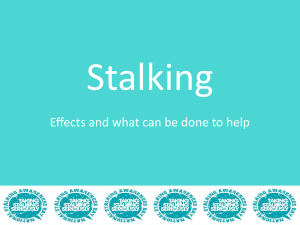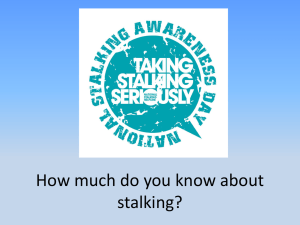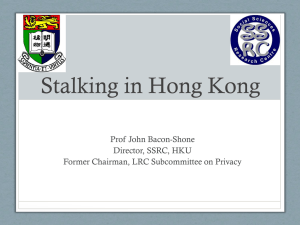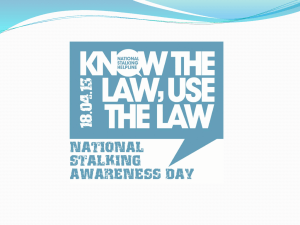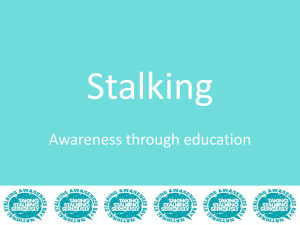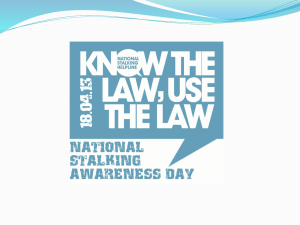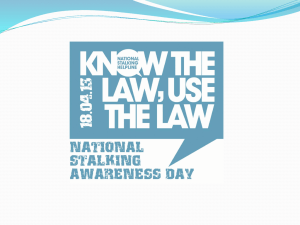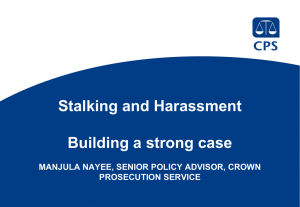Key Headlines from the Stalking Law: Two years on
advertisement
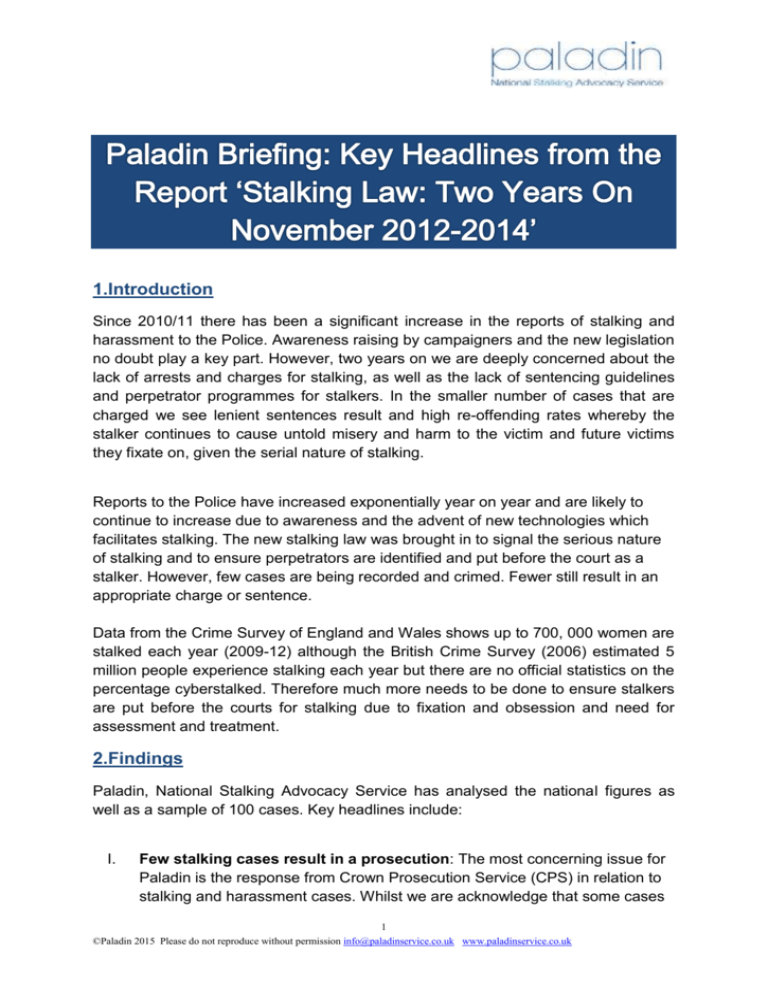
1.Introduction Since 2010/11 there has been a significant increase in the reports of stalking and harassment to the Police. Awareness raising by campaigners and the new legislation no doubt play a key part. However, two years on we are deeply concerned about the lack of arrests and charges for stalking, as well as the lack of sentencing guidelines and perpetrator programmes for stalkers. In the smaller number of cases that are charged we see lenient sentences result and high re-offending rates whereby the stalker continues to cause untold misery and harm to the victim and future victims they fixate on, given the serial nature of stalking. Reports to the Police have increased exponentially year on year and are likely to continue to increase due to awareness and the advent of new technologies which facilitates stalking. The new stalking law was brought in to signal the serious nature of stalking and to ensure perpetrators are identified and put before the court as a stalker. However, few cases are being recorded and crimed. Fewer still result in an appropriate charge or sentence. Data from the Crime Survey of England and Wales shows up to 700, 000 women are stalked each year (2009-12) although the British Crime Survey (2006) estimated 5 million people experience stalking each year but there are no official statistics on the percentage cyberstalked. Therefore much more needs to be done to ensure stalkers are put before the courts for stalking due to fixation and obsession and need for assessment and treatment. 2.Findings Paladin, National Stalking Advocacy Service has analysed the national figures as well as a sample of 100 cases. Key headlines include: I. Few stalking cases result in a prosecution: The most concerning issue for Paladin is the response from Crown Prosecution Service (CPS) in relation to stalking and harassment cases. Whilst we are acknowledge that some cases 1 ©Paladin 2015 Please do not reproduce without permission info@paladinservice.co.uk www.paladinservice.co.uk have been prosecuted as stalking, we have serious concerns about the lack of charging in stalking cases. In 2013/14 CPS figures reveal that 743 stalking offences were prosecuted whereas 9,792 were prosecuted for harassment out of the 61 175 allegations recorded by police. Therefore only 1% of cases of stalking and 16% of cases of harassment recorded by the police result in a charge and prosecution by the CPS. II. Lack of investment in specialist-led training of criminal justice professionals, in particular the CPS, Magistrates, Judges and court staff: Many prosecutors are still not trained to understand and identify the dynamics of stalking and the stalking legislation. Oftentimes the pattern of behaviour (course of conduct) is missed and indirect and direct behaviours are not taken into account. Examination of Paladin’s cases revealed that many cases are charged as much lower offences, if at all, rather than stalking and as a consequence Section 4a stalking charges rarely result. We recommend that a breach of an order is charged alongside the stalking offence, rather than instead of. This way the stalking behaviour is clearly identified. III. Lack of sentencing guidelines for stalking cases: England and Wales still do not have sentencing guidelines for stalking and the last update for harassment occurred in August 2008. Our analysis reveals that only 11% (n=33) of stalkers received an immediate custodial sentence for Section 2a stalking and just 9% (n=14) for a Section 4a stalking offence in 2013. We believe the lack of guidelines has had a serious and detrimental effect on outcomes at court including conditional discharges, suspended sentences or short periods of custody and/or community orders. This needs to be addressed as a matter of urgency. IV. Unduly lenient sentences: Through our casework we have yet to see a sentencing of up to five years for a Section 4a stalking offence; we more often see multiple breaches with limited sanctions and the majority of the stalkers will stalk beyond their sentence. Paladin’s analysis reveals that 55% of perpetrators continued to re-offend and 36% had a previous conviction for harassment. This must to be remedied as a matter of priority to ensure better protection for victims. Additionally, perpetrators need enough time to attend a programme and receive treatment, given the serial nature of stalking and that it is rare to see a complete absence of psychiatric or psychological problems in those who stalk (Mullen, Pathe and Purcell 2001). Stalking is about fixation and obsession and assessment and treatment is required. 2 ©Paladin 2015 Please do not reproduce without permission info@paladinservice.co.uk www.paladinservice.co.uk V. Perpetrator programmes and treatment urgently needed for stalkers: Management of a perpetrator both pre and post sentencing is crucial. There should be mandatory specialist psychiatric assessment as well as treatment for stalkers. A Parliamentary Question (210770)1 was submitted to the Secretary of State for Justice about future plans for programmes for stalkers in the community and in custody. He replied that there were currently no government plans to develop a specific programme for stalkers. This is very concerning and we will count the costs in peoples lives – not only will this result in re-offending and further psychological and physical harm to many victims including possible murders but also in the continuing psycho social damage to the stalker themselves. VI. Register for serial stalkers: there is a clear need to register, track, manage and supervise serial stalkers, just as sex offenders are proactively identified and managed. Serial stalkers should be included on the Violent and Sexual Offenders Register (VISOR) and managed via the Multi Agency Public Protection Arrangements (MAPPA). This framework already exists and should be used for serial stalkers. Many professionals agree along with families and victims. Paladin launched a petition in October 2014 and just under 124, 000 have signed it. Many who have signed it have done so due to personal experience of stalking. VII. Robust and routine scrutiny of the stalking legislation is lacking and is much needed: There must be rigorous scrutiny and tracking of attrition of stalking cases by the Home Office and Ministry of Justice going forward. Continuous review of how the legislation is being used and sentencing outcomes should be monitored routinely to understand what is working and, more importantly, what is not. 3.Conclusion Stalkers steal lives and take lives and many fail to understand this, despite the new legislation. Sentencing is still not being treated as seriously as it deserves to be. There are still too many ‘slap on the wrists’ outcomes and the conviction rate is still too low. The consequence is that the fixated behaviour continues and more victims accrue. This is costly in terms of victim’s lives and financially with the continuing costs being counted at the expense of the revolving door entry back into criminal justice system. 1 http://www.parliament.uk/business/publications/written-questions-answers-statements/written-question/Commons/2014-10-15/210770/ 3 ©Paladin 2015 Please do not reproduce without permission info@paladinservice.co.uk www.paladinservice.co.uk Many stalkers are serial and should be included on ViSOR and managed through MAPPA. Stalking is about fixation and obsession and stalkers must be identified, treated and managed. Whilst it is acknowledged that not all stalkers have psychiatric or psychological problems, it is rare that there is an absence completely. It is important that they are treated and managed effectively and mandatory psychiatric assessment is required. Unduly lenient sentencing does not allow for treatment provision. Clear guidance and sentencing guidelines are required sat alongside training for CPS, Judges, Magistrates and court officials as a matter of urgency. 4.Recommendations Specialist led classroom based training for Police and CPS Single Points of Contact (SPOCs) Paladin to have contact with CPS SPOCs Introduction of a register for serial stalkers and domestic violence perpetrators – ViSOR and MAPPA already exists and should be expanded Sentencing guidelines to be updated to include stalking Stalking should be included in the Attorney Generals crime types that can be subject to review and appeal regarding unduly lenient sentences Development and implementation of perpetrator programmes Good practice highlighted to the CPS to identify stalking as a pattern of behaviour as well as the direct and indirect nature of the behaviours Introduction of a flag for stalking cases by the CPS Highlight good practice for the CPS to charge for stalking alongside a breach of an order Continuous scrutiny of the stalking legislation, how it is being used and it’s effectiveness by the Home Office and Ministry of Justice 4 ©Paladin 2015 Please do not reproduce without permission info@paladinservice.co.uk www.paladinservice.co.uk

